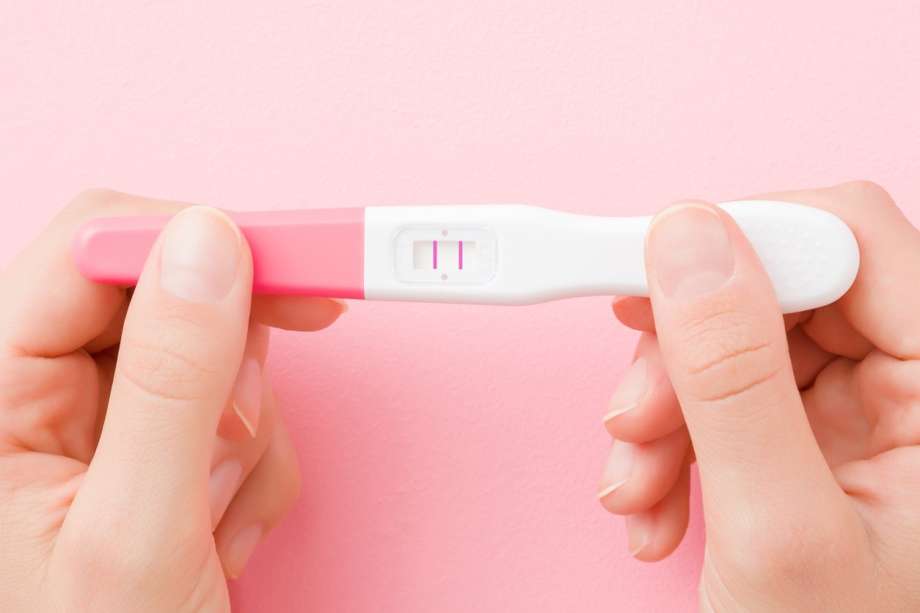Every Explanation for a False Positive Pregnancy Test

If you take a home pregnancy test and the result is positive, a million thoughts may start running through your mind. It can be an overwhelming thing to experience, especially if you weren’t trying to conceive. You might feel a mix of excitement, terror and joy, or you may even immediately start thinking of baby names and what kind of car seat you want to buy. Whatever your reaction – it’s normal.
If you take a pregnancy test at home and the result is positive, it’s important to see a healthcare provider such as an obstetrician or midwife straight away to confirm the results and determine your next steps. If the result turns out to be a false positive, it can make the situation even more overwhelming. It is more common than most people realize to have a false positive, so we’ve listed all the reasons below as to why you could get a false positive result to help you feel more prepared.
How Pregnancy Tests Work
The body of a person who has conceived will start producing a hormone called human chorionic gonadotropin, also known as hCG hormone. The hCG hormone is made by the placenta during pregnancy in order to thicken the uterine lining to support the embryo and prevent menstruation. It can be detected in the urine by a pregnancy test, or by a blood test. The hormone levels rise throughout the first trimester of pregnancy before leveling off and then dropping. If hCG levels dip in the first few weeks, this could potentially mean a loss or miscarriage.
Now that you know how pregnancy tests work, let’s look into all the possible causes of a false-positive result.
1. Medical Conditions

There are certain medical conditions that can not only cause false positive pregnancy test results, but mimic pregnancy symptoms as well. Below is a list of all of the known medical conditions that can be a reason for a false positive result on a blood or urine pregnancy test.
- Kidney disease
- Ovarian cancer (and in rare cases breast cancer, stomach cancer, liver cancer, or lung cancer or other tumors)
- Urinary tract infection or other conditions that result in blood in the urine
- Ovarian cysts
- Pituitary gland or hormone disorders
- Rare antibodies that produce phantom hCG (when the antibodies bind with the molecules in a pregnancy test and signal higher levels of hCG than there are)
2. Certain Medications or Supplements
Below is a list of some medications or supplements that could cause a false positive pregnancy test.
- Antipsychotics (including prochlorperazine or perphenazine)
- Anti-seizure medicine such as carbamazepine
- Anti-anxiety medications (like Valium or Xanax)
- Progestin-only birth control (like Errin or Heather)
- Some types of antihistamines or anti-nausea medication, such as promethazine
- Fertility medications (examples are Pregnyl and Profasi; some fertility treatments involve hCG injections)
- Weight loss medications or supplements that include hCG
- Certain unregulated supplements taken by athletes to increase muscle mass
3. User Error
Not taking a home pregnancy test correctly can also result in a false-positive result. Sometimes taking the test incorrectly can increase the chance of a false negative pregnancy test result as well. Make sure the tests you are using are not past their expiration date, and that you are following all of the directions exactly as written.
Leaving the dipstick in the urine cup or urine stream for the wrong amount of time or testing too early can also give you inaccurate results. You can also have an inaccurate result if you are using the test late in the day, as your urine will be less concentrated and the amount of hCG or pregnancy hormone in your urine may not be detected by the test. Pregnancy tests work best and produce the most accurate results when first-morning urine is used and the test is taken at the time of a missed period or later.
Always follow up with your healthcare provider if you think you may be pregnant.
4. Evaporation Lines
Evaporation lines are actually very common with certain at-home pregnancy tests. They are often confused for a faint positive result. An evaporation line is colorless. This line is seen on a home pregnancy test once the urine has dried or evaporated. This typically happens if you read the test result after the recommended time frame, after the urine has dried on the test. A faint line that is either blue or pink, depending on the test, is a positive.
Other Causes of a Positive Pregnancy Test
Other causes of a positive pregnancy test could be chemical pregnancy, early miscarriage, ectopic pregnancy or molar pregnancy. Each of these conditions result in a positive pregnancy test around the time of a missed period, because there is a fertilized egg and your body starts to produce hCG.
However, these are not viable pregnancies and are each different types of early pregnancy loss. If you have a positive pregnancy test at home and then start bleeding a few days or weeks later, it is likely a chemical pregnancy or an early miscarriage. You should call your healthcare provider for recommendations and management.
If you begin having significant pain in your lower belly after a positive pregnancy test result, it is important to call your healthcare provider right away as this could indicate a pregnancy in the fallopian tube, which is a medical emergency. In a molar pregnancy, an egg has been fertilized and a high level of hCG hormone is detected in the blood, but the pregnancy is not viable and if an embryo is present, it cannot survive past the first trimester.
Finding Support After a False Positive Pregnancy Test
If you and your partner are trying to conceive, it can be heartbreaking to experience a false positive pregnancy test. This can be especially true if you have battled with fertility struggles. It’s important to take care of your mental health as well as your physical health during this difficult time, and seek support from family, friends, or a mental health professional.

